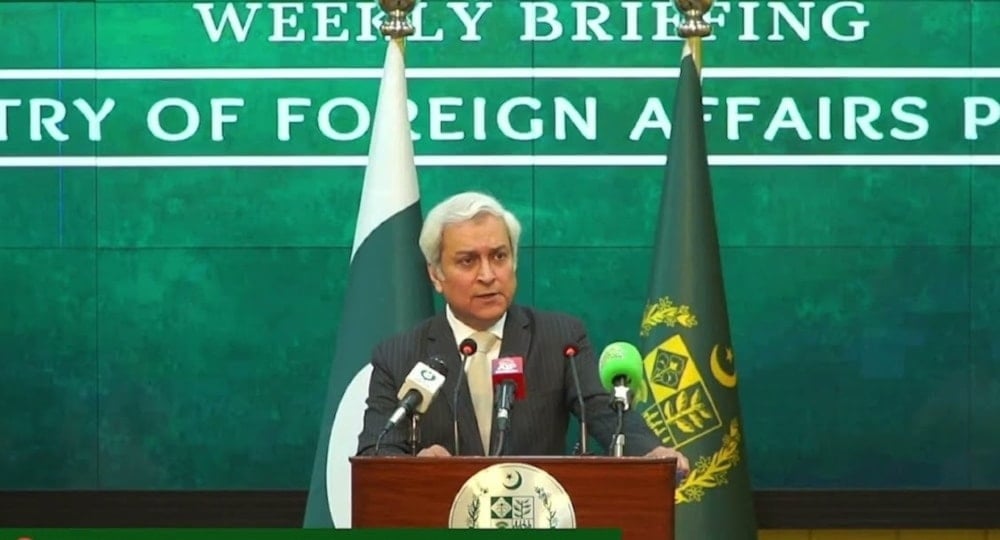Pakistan says no final decision yet on sending troops to Gaza
Pakistan says it has not yet decided whether to join the proposed international stabilization force for Gaza, as the US advances plans for a multinational deployment while Islamabad continues parallel security talks with Afghanistan.
-

Pakistan’s Foreign Ministry spokesperson, Ambassador Tahir Hussain Andarabi, speaks at the ministry’s weekly press briefing. (screengrab)
Pakistan’s Foreign Ministry said on Friday that the government has not yet decided whether it will deploy military personnel to Gaza as part of what is described by the US as an international stabilization force.
Foreign Ministry spokesperson Ambassador Tahir Hussain Andarabi told reporters during the ministry’s weekly briefing that, "With regard to the deployment of Pakistani forces to Gaza as part of the international stabilization force, the decision will be made at the appropriate time and as required." He added that some government bodies have suggested that Parliament may ultimately decide on the matter, calling it "an important point."
His remarks come at a time when the United States is advancing a proposal for a so-called International Stabilization Force (ISF) in Gaza as part of Trump’s wider post-genocide framework.
Earlier reports revealed that Pakistan, Indonesia, and Azerbaijan have been identified by Washington as key potential troop contributors, though none of the three governments has issued a formal commitment. A draft US-authored UN Security Council resolution circulated in early November proposes deploying the multinational force for at least two years, potentially through 2027, granting participating states broad authority over Gaza’s security and administrative arrangements.
While the plan states that no US troops would be stationed inside Gaza, Washington has already deployed around 200 personnel to a civil-military coordination center north of the Strip, operating under CENTCOM.
US officials have also emphasized that any force would rely on cooperation from Arab and Muslim-majority countries and would require Hamas’ consent, as well as approval from the Israeli occupation government.
Critics argue that this US-backed proposal for an “International Stabilization Force” in Gaza is part of a broader strategy to impose foreign control over the Strip, effectively denying Palestinians their right to self-determination and citizenship in their own land, while legitimizing external powers to administer and dictate security and governance under the guise of stabilization.
Istanbul Ceasefire Talks
Andarabi also addressed ongoing talks in Istanbul between Pakistan and Afghanistan, saying the Pakistani delegation had submitted evidence-backed demands to mediators aimed at curbing cross-border terrorism. He noted that the mediators support Pakistan’s position and are reviewing the points with the Afghan Taliban delegation "item by item," though no final assessment has been issued on the current round.
The spokesperson rejected claims that ISIS elements are present in Pakistan, describing the accusations as "false" and insisting that the country remains a "victim of terrorism." He criticized remarks from the Afghan government regarding ISIS, calling them "incorrect."
Andarabi said the ceasefire issue was a key topic in the third round of Pakistan-Afghanistan talks, which began Thursday in Istanbul. He confirmed that the previously agreed ceasefire remains in effect and that senior officials are discussing the details of its implementation.
The latest round follows two earlier meetings held in October, during which the ceasefire agreement signed in Qatar was extended. Pakistan continues to accuse the Afghan government of providing safe haven to the Pakistani Taliban.
Read more: 5 killed in Afghanistan-Pakistan border clash amid peace talks

 3 Min Read
3 Min Read








